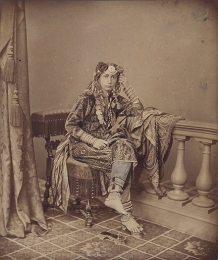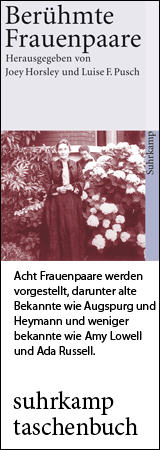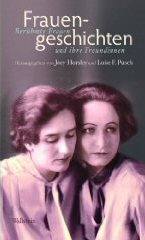
Wikimedia Commons
born on August 30, 1844 in Beit il Mtoni as Sayyida Salme Princess of Oman and Zanzibar
died on February 29, 1924 in Jena, Germany
German writer and teacher, originally Princess of Oman and Zanzibar
100th anniversary of her death on February 29, 2024
180th birthday on August 30, 2024
Biography
“Beit il Mtoni lies by the sea, about eight kilometers from the city of Zanzibar, in lovely surroundings, completely hidden in a grove of magnificent coconut palms, mango trees and other giants of the tropical plant world.”
This was how Emily Ruete began the description of her home in Memoirs of an Arabian Princess from Zanzibar, published in Berlin in 1886. She led an almost fairytale life as the youngest of the 36 children of the Sultan of Oman and Zanzibar, Sayyid Said, and the only child of a Circassian slave abducted and brought to court as a child. Materially, she wanted for nothing; a large number of servants provided every kind of luxury. However, the rules governing life in the palace were extremely strict, and Salme was prone to transgressions even as a child. She did not accept that girls were allowed to learn to read but not to write and taught herself.
Her father died in 1856 and was succeeded on the sultan's throne by her half-brother Madschid, with whom she had got on particularly well as a child. When she was fifteen, she also lost her mother, to cholera.
Salme inherited several plantations with houses and enough money for a lavish lifestyle, first from her father and then from her mother.
She then became involved in palace intrigues: her half-brother Bargash had her write his letters, and when he attempted a coup against Madschid, Salme became embroiled in the conflict. The coup failed and Bargash was banished from the country. Salme reconciled with Madschid, which Bargash resented for the rest of his life.
Salme lived for some time on one of the plantations she had inherited. She was forced to travel there at night, as during the day princesses were only allowed to leave their homes with special permission and when heavily veiled. She herself never explained how in 1866 she met the Hamburg merchant Rudolph Heinrich Ruete, who lived in the house next door. Nicole Vosseler's novel Sterne über Sansibar (Stars over Zanzibar) paints a picture of a love story that supposedly everyone in Zanzibar knew about.
It was only when she became pregnant that there were diplomatic complications. Marriage to a Christian was out of the question, and she was even threatened with stoning. The British vice-consul – at the urging of his wife, to whom Salme had turned for help – organized her escape on a warship bound for Aden. There were formal protests on the part of the Sultan, but actually they were glad to see the problem solved in this way.
On December 7, 1866, Salme's son Heinrich was born; he died a few months later. Salme was baptized and took the name Emily in honor of the diplomat's wife who had interceded on her behalf in Zanzibar. In the meantime, Heinrich Ruete had arrived in Aden and immediately after their wedding on May 30, Emily Ruete and her husband traveled to Hamburg.
In her memoirs she would later describe the culture shock she experienced. Although she lived in comfort and had staff to help her run a Hamburg merchant's household, her husband was often absent and she had to learn to navigate the city. She also struggled in meetings with other families where men and women casually engaged in relaxed conversation with one another and where the women, in her opinion, dressed in a most unseemly manner. In addition, there was the difficulty of learning German. She spoke Kiswahili with her husband.
She gave birth to three more children in quick succession: Antonia Thawka on March 24, 1868, Rudolph Said on April 13, 1869 and Rosalie Guza on April 16, 1870.
Just when she was beginning to adapt to her new life, her husband fell under the wheels of a horse-drawn streetcar. His death on August 6, 1870 plunged Emily into serious trouble: not only did she lose her beloved husband, but Hamburg society snubbed her and the Hamburg authorities denied her inheritance claims.
In order to support her three children, she gave Arabic lessons and tried to live as cheaply as possible, with the help of several friends. She first moved to Dresden, then lived briefly in Berlin, Rudolstadt and Cologne. She also tried to reconnect with her family and to access her inheritance in Zanzibar.
When her brother Bargash came to London on a state visit in 1875, she traveled there, but he refused to meet her and rejected her inheritance claims.
German politicians, who at the time were fighting with the British over territories in East Africa, attempted to capitalize on this conflict. Bismarck himself allowed her to travel to Zanzibar twice – in 1885 and 1888 – on a German ship and accompanied by German officials. But on both occasions the Sultan refused to receive his sister.
In July 1890, Germany and Great Britain signed a treaty on the exchange of colonial territories and Zanzibar then became British. This ended any further political interest in Emily Ruete in Germany.
In the meantime, she had sufficient income from the book she published in 1886 and her work as a teacher. It was not until 1922 that she also received a small pension from Zanzibar, which Bargash's son granted her when he succeeded his father on the Sultan's throne.
She traveled frequently and lived in Beirut for several years, where her son was a consular official. From 1920 until her death, she lived with her daughter Rosa's family in Jena.
Her grave in Hamburg's Ohlsdorf cemetery has been preserved as a celebrity grave. In 2007, a memorial stone was erected for her in the Garden of Women at this cemetery as a memorial against discrimination.
In fact, Emily Ruete was not unpopular in Hamburg circles because of her origins, but because she repeatedly criticized a society that felt it was superior to Muslims. In her memoirs, she draws several comparisons between life at the Sultan's court and in Hamburg that do not favor her new home. For example, she wrote that slaves in Zanzibar had a better life than workers in Hamburg.
There is a room in the Sultan's Palace in Zanzibar that is furnished in her memory and a display in a museum in Stone Town with numerous pictorial and text documents from her life.
Her memoirs are considered to be the first autobiography of an Arab woman. She also published An Arabian Princess Between Two Worlds: Memoirs, Letters Home, Sequels to the Memoirs. Emily Ruete's life has been portrayed in two novels and a film.
(Text from 2018; translated with DeepL.com; edited by Ramona Fararo, 2024.)
Please consult the German version for additional information (pictures, sources, videos, bibliography).
Author: Almut Seiler-Dietrich
Quotes
“In the 1963 novel Trade Winds (German translation: Insel im Sturm) by Mary M. Kaye, the attempted revolution in Zanzibar is described. Emily Ruete plays a supporting role in it. The novel Sterne über Sansibar (Stars over Zanzibar) by Nicole C. Vosseler, published in 2010, tells the life story of Emily Ruete.
In 2013, Swiss author Lukas Hartmann published the novel Abschied von Sansibar (Farewell to Zanzibar) about the eventful life of Emily Ruete and the no less moving fate of her children, who lived into the 1940s.” (Wikipedia).
If you hold the rights to one or more of the images on this page and object to its/their appearance here, please contact Fembio.



